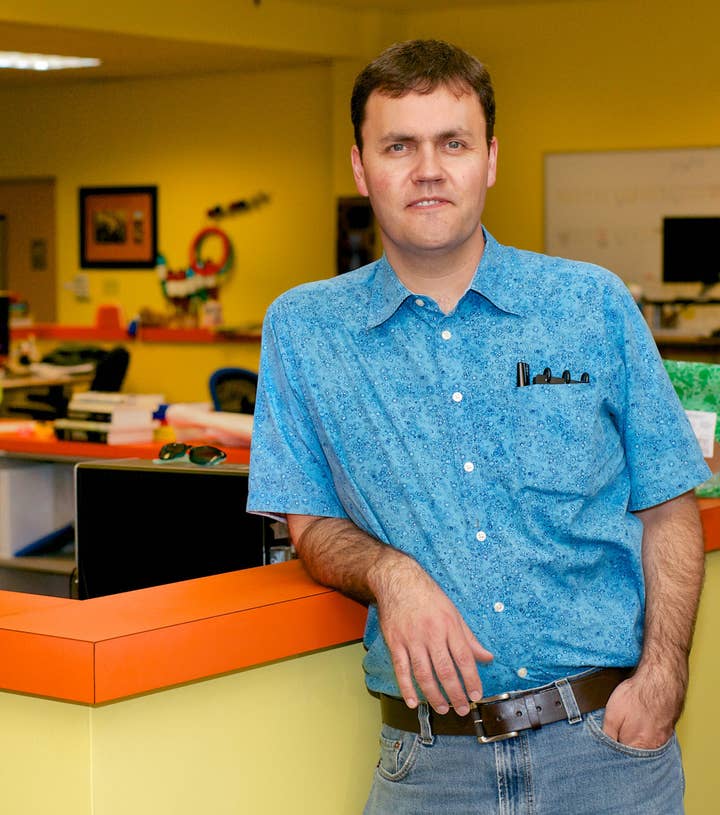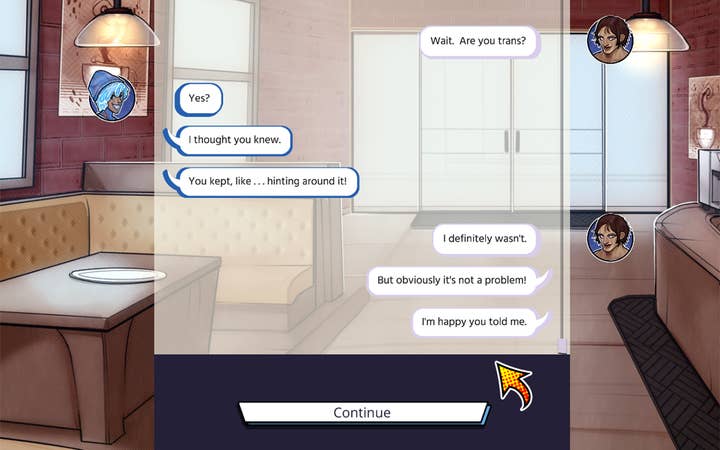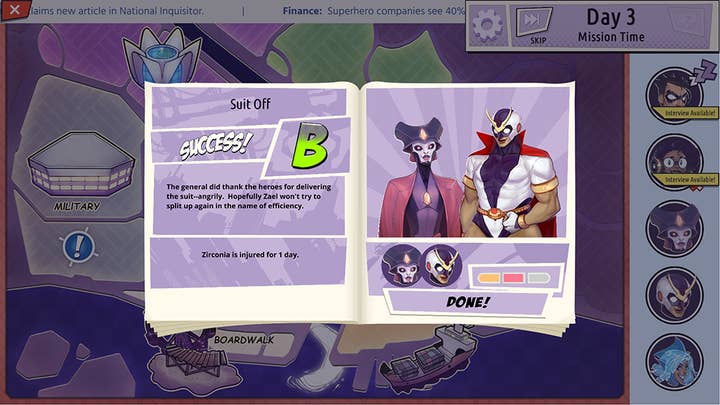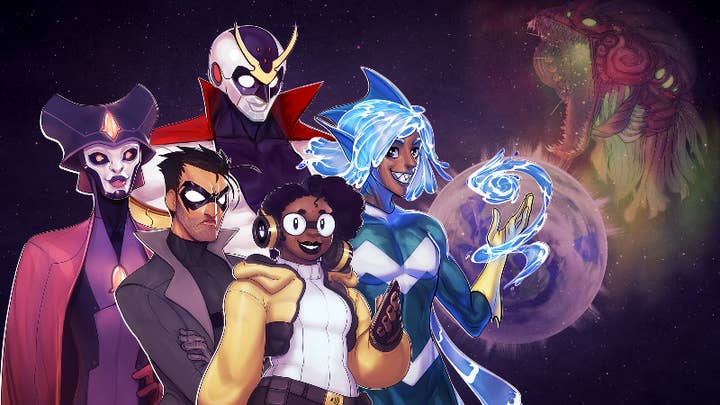Lack of representation in games is "partly an issue of values, partly an issue of bravery"
Jesse Schell discusses the development of superhero dating sim Mission: It's Complicated
"Love has many forms." That's the central message of Mission: It's Complicated, a free superhero dating game released earlier this year by Schell Games.
Unlike most dating sims, the player's character is not the one seeking romance. Instead, you encourage pairs of superheroes to bond by completing missions together then going on dates, as only a duo that truly loves each other will be able to defeat the Eater of Worlds.
But, as you're informed in the game's intro, love is not solely defined by romantic or sexual feelings, nor is it defined by gender.
Mission: It's Complicated enables players to nurture the relationships between characters that are gay, lesbian, bisexual, trans and more, and can even win the game with two heroes that share a strong friendship.
The concept of building relationships between heroes was central to the game from its inception, but the team faced a decision: choose which pairs the players could form, or enable complete freedom, regardless of gender, sexuality and other factors.

"The team was like, 'let's see if we can do that, let's try and embrace it, and since we're embracing it, let's make that a major theme of the game,'" founder and CEO Jesse Schell recalls.
"That's part of what's so interesting about it: some of the relationships are romantic, some are platonic, but you don't know which ones are going to be which. That leads to a kind of suspense, and we find the fun for a lot of players is seeing what happens if they get two characters to work together.
"We also partly realised that by embracing this, we'd be going into a place very few games have gone -- giving players the ability to pair up any pair of characters in the game. There are lots of dating sims where you are the protagonist and then there's all these characters that you might date, and it's kind of a one way relationship. But this idea where you can make pairs with anybody, that felt like something very new and fun."
Released on Valentine's Day, Mission: It's Complicated originated from another project the team had worked on: a chat engine for a virtual health coach that offers advice on quitting smoking, losing weight and so on. With the tech complete, the team pondered how it could be used in entertainment.
The original proposal was a visual novel where you would play the dispatcher for a team like the Ghostbusters, opening the team up to an action-packed story without the need for animation and graphics beyond their budget. The idea evolved into a superhero game, then superhero dating game, spurred on by the prominence of 'shipping' in the comics community, where fans imagine their own romantic pairings.
"There are plenty of big studios run by a bunch of bros. They're not necessarily going to be socially progressive"
Fan ships often break the boundaries of gender and sexuality, and Schell Games was keen to represent as much of the LGBTQ+ community as it could within its title.
"That's something the team got pretty excited about," says Schell. "If we could do this well, it would be pretty special. They took everything they knew about culture in these different communities and tried to put the different stories together.
"We were really nervous about it because not only are we trying to tell stories about all these different sexuality situations, we were trying to make them humorous as well -- and it's really easy to accidentally get into a zone where you're offending people."
This was made even more challenging by the decision to tackle complex and sensitive issues that go beyond characters' feelings for each other, often within very quickfire conversations. During one coffee date, for example, two heroes both affirm that they're gay, before one reveals they are trans, and the other offers assurance and acceptance. The discussion even turns to transgender hormone therapy.
The conversation comes across as natural, calm and comfortable. Schell attributes this to the fact the director is also a novelist, and all too familiar with the need for efficient but respectful dialogue, as well as how determined the rest of the crew was on ensuring this sort of conversation was handled correctly.

"This was a huge passion project for the team. It wasn't like we thrust this on them, 'Here's the concept, go with it.' It completely originated from them. They had a handle on it from the beginning and we could see that. We wanted them to run with it and make it work."
To ensure offense was avoided, the studio hired specialists to read through everything and ensure the tone was appropriate, highlighting anything that might be unintentionally offensive and suggesting ways to fix this.
"The bigger and more conservative your community is, the more you're going to have difficult conversations and not everybody's up for that"
"In particular, I remember the team was worried about the trans conversations," Schell says. "The experts told us we were okay there, but there were a few things we needed to change with a different character. That was a bit of a surprise, because we thought we had that one handled. So we're really glad we brought in specialists to help advise on the writing.
"We're trying to make this something really fun, really inclusive, and if it was accidentally offensive to someone, it would really be working against its own purpose. So this is something we gave a lot of attention to. We didn't want to be afraid of it, we wanted to get in there and make it work."
While the developers informally consulted as many people as they could, both within the studio and through friends and family, Schell emphasises the importance of hiring specialists to ensure everything rings true.
Just a brief playthrough shows the care that has been taken to represent as many people as possible -- something that arguably cannot be said of superheroes in other mediums. While Marvel's comics, for example, have done a solid job of representing different cultures, genders and sexualities, it took ten years for the current film series to have a black superhero lead, eleven for a female.
Games like Mission: It's Complicated stand out as bolder -- although Schell acknowledges that his studio's indie nature is a crucial factor here.

"[Indie] games can take risks the same way comics can take risks. There's just way less at stake, honestly. That's partly why Marvel was able to blaze a lot of trails. If you look at the comics audience in general -- particularly back in the '60s, '70s and '80s -- the audience already generally saw themselves as outsiders. That's something Marvel and Stan Lee understood really well so they made these stories about real outsider characters -- The Incredible Hulk, Doctor Strange, Prince Namor. There's a lot of characters that are just shunned by society, even Peter Parker.
"We're trying to make something really fun and inclusive. If it was accidentally offensive to someone, it would be working against its own purpose"
"So that's already innate in comics, they can push that really easily, and they honestly didn't have that much on the line. They could drop six issues of a comic and if it bombed, what did they lose? But on the flip side, when Hollywood makes a mistake, they're risking $100 million every time they do one of these. So I can kind of sympathise with them being a little behind the curve. That's generally how they tend to be.
"We can afford to be a little more out there. We don't need 100 million people to play our game for it to be a success, we just need the right people, the ones that this will resonate with, to be able to find the game."
This speaks to why representation is so lacking in larger games, especially in the AAA space. While there are exceptions, such as Dragon Age, Schell believes there are two crucial reasons why such issues are not tackled in the characters seen in blockbuster games.
"One is that it's just the AAA culture," he says. "There are plenty of big studios run by a bunch of bros -- that's just how it is. They're not necessarily going to be socially progressive. Secondly, the markets they go for aren't always going to welcome these messages and it leads to uncomfortable conversations they're going to have to have.
"It's partly an issue of values, it's partly an issue of bravery. It's not an easy thing to do. They can do it, but it's challenging to get it right. The bigger your community and the more conservative they are, the more you're going to have difficult conversations and not everybody's up for that."
Mission: It's Complicated released to positive reviews, and the studio is gauging how well the game takes off before considering other platforms such as mobile. Schell notes that the virality of visual novels is inherently slower than in other genres, but is satisfied with the game's performance so far.
Inevitably, anything that dares to explore subjects like sexuality and gender identity meet with resistance and often backlash from certain corners of the gaming audience. But while Schell acknowledges the studio has received a few comments from people, these have been the minority.
"I think part of it is that it's not like we're hiding it," he concludes. "People get most upset when they go in expecting one thing and then it turns out to have things that make them personally uncomfortable. That's when they get agitated. We've tried to make it clear what this is and what it's like. There has been a little bit of grumbling from some people, but it's okay, because it's just not a game for them."

